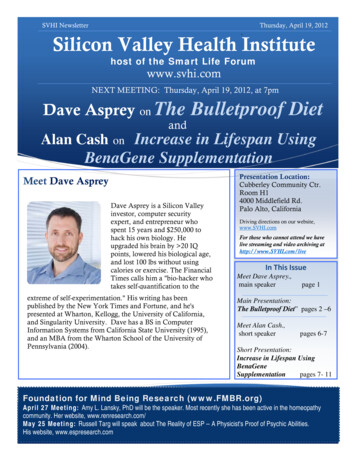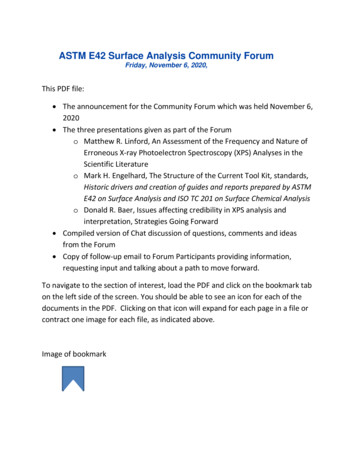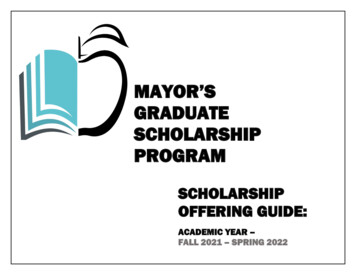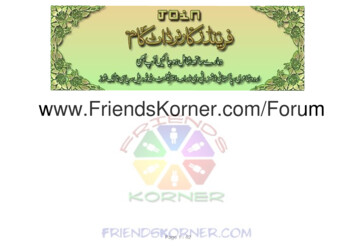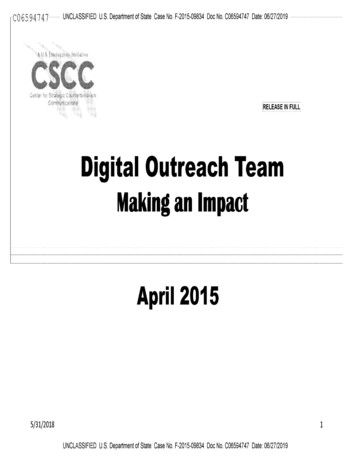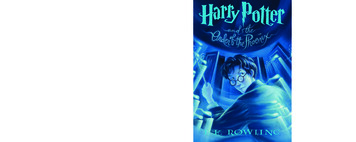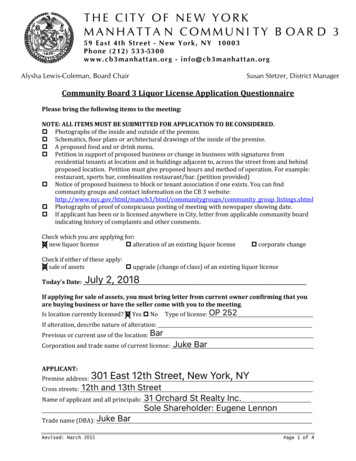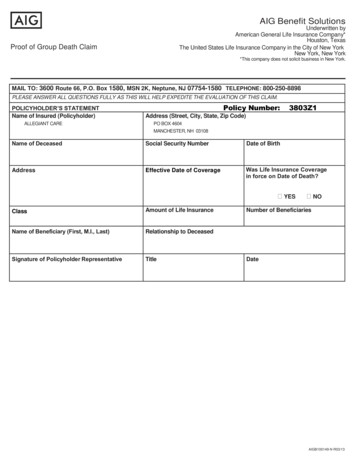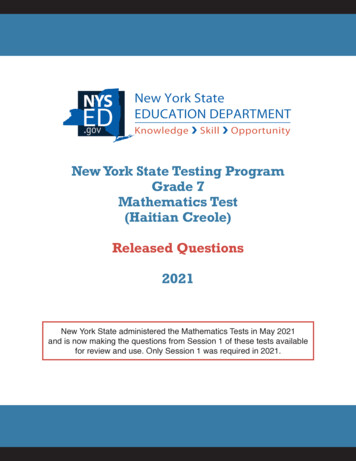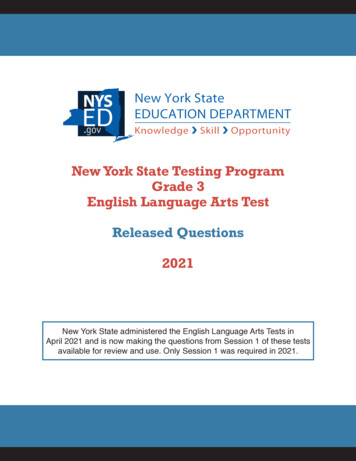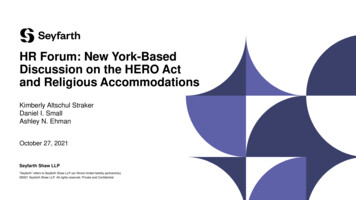
Transcription
HR Forum: New York-BasedDiscussion on the HERO Actand Religious AccommodationsKimberly Altschul StrakerDaniel I. SmallAshley N. EhmanOctober 27, 2021Seyfarth Shaw LLP“Seyfarth” refers to Seyfarth Shaw LLP (an Illinois limited liability partnership). 2021 Seyfarth Shaw LLP. All rights reserved. Private and Confidential
SpeakersKimberly Altschul StrakerSenior CounselDaniel I. SmallAssociateAshley N. EhmanSenior FellowNEW YORKNEW YORKNEW YORK 2021 Seyfarth Shaw LLP. All rights reserved. Private and Confidential2
Agenda0102030506Welcome and IntroductionsNew York HERO ActReligious AccommodationsQuestionsSpeaker “Office Hours” 2021 Seyfarth Shaw LLP. All rights reserved. Private and Confidential3
New York HERO Act 2021 Seyfarth Shaw LLP. All rights reserved. Private and Confidential4
NY HERO Act ‒ Basics Signed into law on May 5, 2021 Amended on June 14, 2021 Law intended to combat the spread of airborneinfectious diseases in the workplace by requiringthe adoption of workplace safety standards Applies to all private employers – no size oremployee count threshold Employee defined broadly Includes independent contractors; part-time,domestic workers; home health and personal careworkers; seasonal workers, etc. 2021 Seyfarth Shaw LLP. All rights reserved. Private and Confidential5
NY HERO Act – Workplace Safety Standards The Act required NYS Department of Labor (“DOL”)to publish model safety protocols. Both general standard and industry specific standards The Act required employers to either (i) adopt theDOL-issued protocol that is relevant to their industry,OR (ii) establish disease prevention plan that meetsor exceeds the requirements of the DOL-issuedstandard solicit employee participation. The protocol/plan must address many familiartopics, including: (1) employee health screenings, (2) face coverings, (3)personal protective equipment, (4) social distancing,and (5) cleaning and disinfecting protocols 2021 Seyfarth Shaw LLP. All rights reserved. Private and Confidential6
NY HERO Act – Workplace Safety Standards (Cont.) Industry-Specific Guidance from the NYS DOL includes: (1) Agriculture, (2) Construction, (3) Delivery Services, (4) Domestic Workers,(5) Emergency Response, (6) Food Services, (7) Manufacturing and Industry,(8) Personal Services, (9) Private Education, (10) Private Transportation, and(11) Retail Industry specific templates found here: https://dol.ny.gov/ny-hero-act Notably, office-based work did not warrant its own specific guidance. Link to the Model Prevention vention-plan-p765.pdf 2021 Seyfarth Shaw LLP. All rights reserved. Private and Confidential7
NY HERO Act – Notice & Distribution As of September 4, 2021, employers were required to: Distribute protocol to their current employees Provide protocol to all new employees (see below re: handbook) Provide protocol to all employees after a business reopens (if it was requiredto close due to airborne infectious disease) Post in a “visible and prominent location” in the workplace Include in an employee handbook if the employer already has a handbook 2021 Seyfarth Shaw LLP. All rights reserved. Private and Confidential8
NY HERO Act – Plan Activation As of September 6, 2021, employers wererequired to activate their plans and implement thevarious mitigation measures detailed in safety plan,including: Masking Daily health screening TrainingDesignation triggering activation is currently in place onlythrough October 31, 2021. If not extended, abovemeasures (other than training) can end. 2021 Seyfarth Shaw LLP. All rights reserved. Private and Confidential9
NY HERO Act – Employee Rights & Non-Retaliation Under the Act, employees may: Report violations of the prevention plan to any state, local, or federalgovernment Report airborne infectious disease exposure concerns to his/her employer, orstate, local, or federal government Refuse to work if the employee “reasonably believes” in “good faith” that thework exposes him/her, other workers, or the public to “unreasonable” risk ofexposure Employers, their agents, or persons acting on behalf of the employer areprohibited from: Threatening, retaliating against, or taking adverse action against an employeewho exercises his or her rights under the Act 2021 Seyfarth Shaw LLP. All rights reserved. Private and Confidential10
NY HERO Act – Penalties for Violations The NYS DOL can assess penalties against employers for non-compliance: 50 per day for failure to adopt or establish a prevention plan 1,000 to 10,000 for failure to comply with that plan The Act provides a private right of action Individuals can sue for injunctive relief if an employer fails to comply with the Act. Allows for awards of attorney’s fees and costs to prevailingplaintiffs Notice and cure period of 30 days, unless employee demonstrates“unwillingness to cure a violation in bad faith” byemployer Employers can be awarded attorney’s fees andcosts if required to defend against lawsuit deemedto be “frivolous.” 2021 Seyfarth Shaw LLP. All rights reserved. Private and Confidential11
NY HERO Act – Joint Labor-Management Workplace SafetyCommittee Starting November 1, 2021 – employers with 10 or more employees must permitformation of joint labor-management workplace safety committees. Committees will be comprised of at least 2/3 non-supervisory employees andselected by non-supervisory employees. Committee members are allowed to: raise concerns regarding workplace healthand safety issues, review employer workplace safety policies, participate ingovernment site visits, meet at least once a quarter, and attend trainings on-theclock. DOL has promised to issue guidelines before the effective date. 2021 Seyfarth Shaw LLP. All rights reserved. Private and Confidential12
ReligiousAccommodations 2021 Seyfarth Shaw LLP. All rights reserved. Private and Confidential13
Religious Accommodations During the Pandemic Employers can mandate vaccines foremployees who physically enter theworkplace. What about employees who cannotvaccinate because of a sincerely heldreligious belief? Under the New York State Human RightsLaw, employees with a sincerely heldreligious belief may request a reasonableaccommodation. 2021 Seyfarth Shaw LLP. All rights reserved. Private and Confidential14
Religion Defined Religion broadly defined The EEOC defines “religion” to include “allaspects of religious observance and practice aswell as belief.” Religious beliefs include: Beliefs tied to formal, organized religions Beliefs that are new, uncommon, or not part of aformal religion Beliefs that are followed by a small number ofpeople Religious beliefs do not include: Social, political, and economic philosophies Personal preferences 2021 Seyfarth Shaw LLP. All rights reserved. Private and Confidential15
Sincerely Held Religious Belief Only sincerely held religious beliefs are protected by law. The burden is on the employee to present a sincerely held religious beliefthat conflicts with the job requirement. An employee may do this by completing an exemption request form thatincludes:‒ A specific religious doctrine or belief‒ An explanation as to how the religious doctrine or belief prevents compliance‒ A request for a reasonable accommodation However, employers may take steps to inquire into the sincerity of theemployee’s religious belief. 2021 Seyfarth Shaw LLP. All rights reserved. Private and Confidential16
Questioning the Sincerity of a Religious Objection Employers should use caution when inquiring into anemployee’s religious belief. Employers may conduct a further inquiry into theemployee’s religious belief when the employer hasreason to question sincerity. Objective reasons to inquire: Use of boilerplate forms purchased or downloaded online Multiple employees submitting identical requests Sudden shift from secular objections to religiousobjections Vague or incomplete requests 2021 Seyfarth Shaw LLP. All rights reserved. Private and Confidential17
Questioning the Sincerity of a Religious Objection (Cont.) The follow-up inquiry should take the form of aninteractive dialogue between the employer and theemployee. Open-ended questions will provide usefulinformation. Areas of further inquiry may include: What the employee knows about the vaccine The specific religious doctrines or beliefs cited How the company policies and/or procedures conflictwith the employee’s beliefs Whether the employee has received other vaccinationsas an adult and if so, how the COVID-19 vaccine isdifferent 2021 Seyfarth Shaw LLP. All rights reserved. Private and Confidential18
Permissible Follow-Up Questions “What is the name of your religion (if any)?” “What is the nature of your beliefs/practices/observances?” “When did you first begin to embrace these beliefs/observances/practices?” “How do the company’s policies and/or procedures conflict with your beliefs,observances, or practices?” “I am respectful of whatever you believe, but I need to better understand it in order toconsider your request. What is it about your religious beliefs or practices thatprevents you from getting vaccinated.” “Have you ever received any vaccines before? What is the difference between yourgetting vaccinated before and now?” “Any additional information regarding your beliefs, observances, or practices thatsupport your request for a religious accommodation?” 2021 Seyfarth Shaw LLP. All rights reserved. Private and Confidential19
Undue Hardship If an employee states a religious belief that is sincerely held, employers mustprovide a reasonable accommodation unless doing so would pose an unduehardship. Undue hardship is defined as having more than a de minimis cost or burden onthe employer. Things to consider: Possibility of remote work Frequency of in-person meetings or gatherings Availability of alternative positions Risk posed to other employees, patients, customers, clients, or vendors 2021 Seyfarth Shaw LLP. All rights reserved. Private and Confidential20
Undue Hardship – Remote Work Many employees are requesting to workremotely in lieu of getting the vaccine. When evaluating such requests, employersshould consider: Whether other similarly situated employeeswork remotely? If the job was remote during the pandemic,why or how is continuing remote work anundue hardship now? 2021 Seyfarth Shaw LLP. All rights reserved. Private and Confidential21
Step-by-Step Religious Accommodation HypotheticalPlease specify the religious belief, practice, or observance that is the basis for your requestfor accommodation.My religion is Christianity. In accordance with my Catholic faith, I do not believe in medical intervention.My faith instructs me that God is the ultimate healer and will protect me from disease.Please specify the work requirement that conflicts with the religious belief, practice, orobservance described above and explain the nature of the conflict.The company’s mandatory vaccination policy conflicts with my beliefs, because a vaccine is consideredmedical intervention.Please describe the specific accommodation(s) that you are requesting at this time,including an explanation of how the requested accommodation(s) will enable you to meetyour religious obligations without impacting your ability to meet the required/essentialfunctions of your job and the duration of the accommodation needed.I am requesting to work remotely. I have worked remotely for the last year and a half, so doing so willnot impact the quality of my work. If I am able to work remotely, my vaccination status will not pose arisk to others entering the workplace. 2021 Seyfarth Shaw LLP. All rights reserved. Private and Confidential22
Questions 2021 Seyfarth Shaw LLP. All rights reserved. Private and Confidential23
Thank You 2021 Seyfarth Shaw LLP. All rights reserved. Private and Confidential24
Legal DisclaimerThis presentation has been prepared by Seyfarth Shaw LLP forinformational purposes only. The material discussed during this webinarshould not be construed as legal advice or a legal opinion on any specificfacts or circumstances. The content is intended for general informationpurposes only, and you are urged to consult a lawyer concerning yourown situation and any specific legal questions you may have.Seyfarth Shaw LLP“Seyfarth” refers to Seyfarth Shaw LLP (an Illinois limited liability partnership). 2020 Seyfarth Shaw LLP. All rights reserved. Private and Confidential
NY HERO Act –Notice & Distribution As of September 4, 2021, employers were required to: Distribute protocol to their current employees Provide protocol to all new employees (see below re: handbook) Provide protocol to all employees after a business reopens (if it
